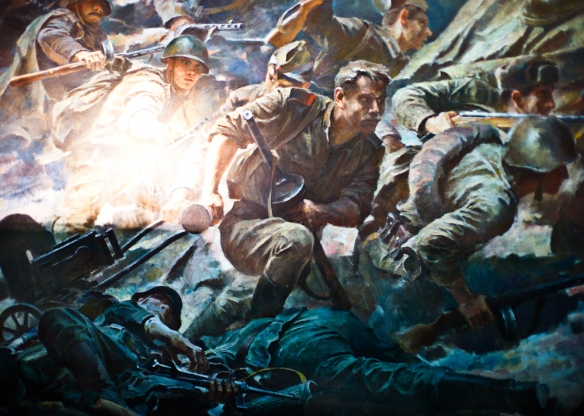
Though brave, Red Army soldiers were tactically inept, often absurdly so. Officers were trained to undertake only frontal assaults, even across open terrain. A German account of Soviet counter-attacks on a German strong point on the approach to Kiev exemplifies both Soviet persistence and Soviet ineptitude. The attack began with an artillery barrage that fell behind the German emplacement, causing no damage. Then from a thousand yards distant, a hundred yards or so separating each line, wave after wave of infantrymen rose up out of the grass and with bayonets fixed tramped towards the German lines. The first line was mowed down almost to a man by machine-gun fire; the second was hit but was able to reform. Then the men ran towards the German guns, shouting in unison. They moved more slowly when they reached the piles of dead, stepping over or between them. Officers on horseback bullied them on and were shot by German snipers. The attack faltered and broke, then was repeated, using the same methods, four more times, each time without success. German machine-gunners found that their guns became too hot for them to touch. ‘The fury of the attacks,’ the report continued, ‘had exhausted and numbed us completely…a sense of depression settled upon us. What we were now engaged in would be a long, bitter and hard-fought war.’ —J. Lucas, War on the Eastern Front: The German Soldier in Russia 1941‐1945 (London, 1979), pp. 31-3.
In August Hitler changed his mind about the priority to Army Group Centre he had given in June and switched the main German effort to clearing the Ukraine and seizing Kiev. The change was strongly resisted by the army leadership, who wanted to capitalize on the victory at Smolensk by pushing on rapidly to Moscow and destroying what remained of the Red Army in the process. Theirs was the view of Clausewitz: concentrate on the destruction of the enemy’s forces. They did not share Hitler’s view that what counted in war was economics. The seizure of the ‘Ukraine, with its rich grainlands, its mines and metals plants, was part and parcel of the pursuit of ‘living-space’. Hitler believed that the loss of these resources would spell disaster for the Soviet war effort and make the new German order invincible.
Hitler prevailed and in the process possibly saved the Soviet capital. The capital of the Ukraine was less fortunate. Though under heavy harassing attack, bogged down by autumn rains, and short of tanks and aircraft, the First Panzer Group from the north and the Second Panzer Group moving from the south met up far to the east of Kiev. In Moscow the German shift from the central front to the southern had been anticipated in August. General Yeremenko, who lost his wife and young child in the initial German onslaught, was given charge of the counter-offensive to save the Ukraine. The attempt failed. Stalin urged Yeremenko to report victories and poured in precious reserves from other parts of the front to bolster the Soviet attack. They were all squandered in the effort to prevent another catastrophic encirclement. Stalin refused to let Kiev be abandoned to the enemy, though only a strategic withdrawal would have saved the Soviet forces, as Zhukov had argued in July. Without a specific order from Stalin, the local commander in Kiev refused all demands from his colleagues that he save the army by retreating? politically prudent no doubt, but militarily disastrous. When even Stalin had to accept the reality that German forces had encircled Kiev and its hinterlands, it was too late. Evacuation of the front was ordered on September 17, but the order never reached the embattled garrison in Kiev, which fought on in the ruins of the ancient city for two more days before surrendering. The rest of the trapped army, except for small groups of stragglers who fought their way out, became prisoners. In all 527,000 men were killed or captured, and the way was open for German armies, though battle-weary and greatly depleted, to occupy the rest of the Ukraine and the Crimean peninsula. Most senior commanders lost their lives in the final battering of the pocket by German aircraft and artillery. The Kiev Front commander, General Mikhail Kirponos, was ambushed with a thousand men as he tried to break out. Wounded in the leg, he fought on until the splinters from an exploding mine abruptly dispatched him.